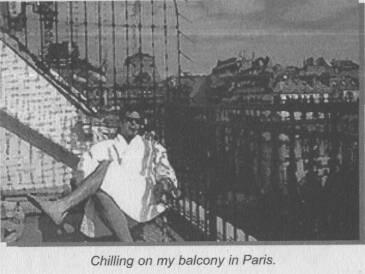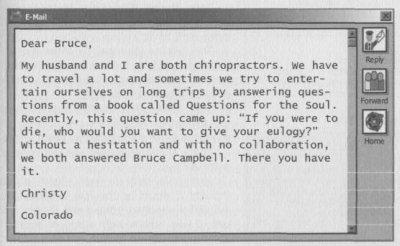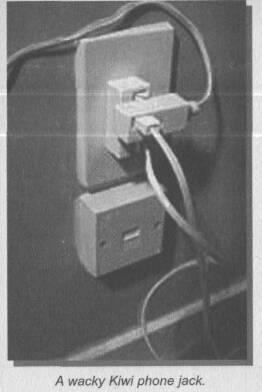If Chins Could Kill: Confessions of a B Movie Actor (50 page)
Read If Chins Could Kill: Confessions of a B Movie Actor Online
Authors: Bruce Campbell
Tags: #Autobiography, #United States, #General, #Biography & Autobiography, #Biography, #Entertainment & Performing Arts - General, #Entertainment & Performing Arts, #Actors, #Performing Arts, #Entertainment & Performing Arts - Actors & Actresses, #1958-, #History & Criticism, #Film & Video, #Bruce, #Motion picture actors and actr, #Film & Video - History & Criticism, #Campbell, #Motion picture actors and actresses - United States, #Film & Video - General, #Motion picture actors and actresses

Every so often, projects fall into my lap and I simply can't say no. I remember watching an obscure French film on TV late one night and the lead actor was Stuart Whitman. He played a hopeless romantic, painting pictures and staring out to sea.
What the hell was this?
I thought.
This guy does Westerns, doesn't he?
I was working in New Zealand on a
Xena
episode and a script arrived, along with an offer to play an American actor in a French film. The script was so unusual, so non-Hollywood, it really caught my interest, but I didn't even know how to judge whether the part was good or not. There were plenty of references to my character, but he didn't have a lot of dialogue.
What the hell,
I figured.
It would mean a trip to France -- I'd be crazy not to follow through on it.
Next thing I knew, I was puffing a cigar on the balcony of my groovy pad in the middle of Paris. How an actor, known primarily for slice-and-dice genre films would wind up in a French film was a puzzler, even to me, and I must admit that it was hard to mask my smirk for the first couple days. The film was called
La Patinoire.
Translated, it means,
The Ice Rink,
and it was a film within a film. Jean Phillipe Toussaint was the
auteur --
he had a Woody Allen/Robert Altman sensibility and that seemed fine by me.
The next three weeks were spent in an ice rink in Franconville, a suburb of Paris. I was whisked there, at outrageously high speeds, courtesy of my appointed driver, Lionel. To get the feel of what that was like, run out and buy the soundtrack to
The Saint
and rent the film
Ronin.
Crank up the volume on the title track, cue
Ronin
to the big car chase, and you'll get a basic sense of the horror/ecstasy I endured every morning.
Because I wanted to be a gracious guest during my stay, each morning, as Lionel narrowly avoided pedestrians, he would help me translate a greeting into French. It became the "phrase of the day," usually something utterly absurd, and I would announce it to the crew upon arrival. A personal favorite was, "Last night, my good friend Jacques Chirac and I were drinking beer and watching soccer. He insulted me, so I was forced to kick his pimply ass."
Because France was outside the jurisdiction of the Screen Actors Guild, rules like overtime, fringes, forced calls or dressing rooms had no bearing whatsoever. All the actors tossed their stuff in a small room and the only place to hang out was on set.
One day, between shots, I happened to ask producer Anne-Dominique how the hell they had even heard of me, let alone why the role was offered. She casually pointed to a production assistant, Raphael.
"He recommended you," she said, matter-of-fact. "He was a fan of your films."
46
MESSIN' WITH THE MYTH
Ask anyone where New Zealand is, and nine times out of ten, they'll say, "I don't even know where
Old
Zealand is..."
Situated in the Southern Hemisphere, in the shadow of Australia, New Zealand consists of two islands, running north and south, and boasts a population of three million people and sixty million sheep -- with stats like that, where else would you shoot a TV show about
Hercules?
Universal Studios brought the idea of a show, based on the mythical character, to the attention of Rob Tapert and Sam Raimi in 1993.
Bruce: So, these guys just came to you and said, "Do this"?
Rob: Yeah, they did. We had a production deal there, so it was only logical. Sam and I said, "Okay we will, but we'll make it our own way." And so, we took the formula for
Army of Darkness
-- a funny hero who speaks kind of modern in ancient times.
The lead actor cast was Minnesotan, Kevin Sorbo. Ironically, Kevin had worked in New Zealand even before Sam and Rob -- he was known locally as "the Jim Beam guy," for several liquor commercials he'd done there.
Rob: We said we needed big location value, so we sent our line-producer, Eric Gruendemann, to a few different places and one was New Zealand. We got the pictures and videos back and they had lava pits and deserts and oceans and woods and a --
Bruce: -- And it was cheap.
Rob: Almost fifty cents on the dollar. Plus, they spoke English, so we said, "All right, we'll try it."
The original idea was to shoot five TV films and see how it went from there. Josh Becker was brought down early on, originally as second unit director.
Josh: I talked Rob into it during a fishing trip in northern Michigan. I wound up on the same flight going down as Kevin Sorbo.
Bruce: Did anyone think this would go as a series?
Josh: We had no idea. Most of us thought it would be the five TV films and out. After shooting some shots for the last one, I was walking with Kevin on location and I go, "I talked to Rob and he's getting really good responses and this thing might very well go to series." Kevin says, "You know, I've heard that so many times. I've been in about five pilots -- I'm not holding my breath."
Before the TV films had wrapped shooting in mid-1994,
Hercules: The Legendary Journeys
TV show got the green light for thirteen episodes, and the Southern Hemisphere Saga began.
At first glance, Auckland, New Zealand, seems just like any other moderately-sized metropolis. Upon closer inspection, or in my case, upon repeated visits, the differences became apparent.
For starters, cars drive on the left side of the road -- a remnant of the fading British Empire. After being corrected numerous times, I have since dropped the notion that they drive on the "wrong" side of the road, merely the "opposite" side. This funky concept was compounded by a steering wheel that is on the "opposite" or "wrong" side of the car, along with various controls. I can't tell you how many times I tried to make a turn and fired up the windshield wipers instead.
Money is interesting in New Zealand -- each denomination is a different color and the bills are tear-proof, with a cute see-through window. Single dollar and two-dollar coins are very popular, but an extended stay can produce enough weight in coins to injure someone. The exchange rate tends to lessen the pain of such hardship -- as of this printing, our dollar is worth twice as much.
The Kiwi dollar may be weak, but their power is a robust 220 volts compared to our 110 -- a burned-out Zip drive and CD player attest to my ignorance of this. I have enjoyed the obvious difference in superheated water, insta-hot irons and kick-butt microwave ovens.
Kiwi foods and beverages are stronger as well -- beer has almost twice the alcoholic content and the food is, to borrow a Kiwi phrase, "full on." Kiwi bacon could easily be mistaken for ham in the U.S., and the phrases "lite" and "fat free" are only now seeping into their mainstream marketing.
With regard to processing, food in New Zealand hovers around fifteen years behind the States, but I don't find that entirely undesirable -- I'll take simple, hearty food over multiprocessed pseudo-food any day of the week. Interestingly, to the naked eye, the Kiwis are generally a hearty, less obese group of people.
Make no mistake, however -- culturally speaking, the Americans have landed. I found a charming example of this in an exchange with a crew member.
"Do you have KFC in the States?" he asked innocently.
"Uh, yes we do," I explained delicately. "See, it stands for
Kentucky
Fried Chicken."
A Kiwi Primer
-A-
- American -- Yank
- Apartment -- Flat
- Ass -- Arse
-B-
- Bandaid -- Plaster
- Body Shop -- Panelbeater
- Butt -- Bum
-C-
- Canned Pet Food -- Jellymeat
- Castrating Lambs -- Docking
- Cooler -- Chilly Bin
-D-
- Diaper -- Nappy
- Dress -- Frock
- Drunk -- Pissed
-E-
- Elevator -- Lift
- Exhausted -- Buggered
- Expensive -- Dear
-F-
- Field -- Paddock
- Flashlight -- Torch
- French Fries -- Chips
-G-
- Gasoline -- Petrol
- Good-bye -- Cheers
- Ground Beef -- Mince
-H-
- High School -- Tertiary Education
- Horny -- Randy
- Humorous Person -- Dag
-J-
- Jacket -- Jumper
- Jello -- Jelly
-K-
- Ketchup/catsup -- Tomato Sauce
- Kindergarten -- Kindy
- Kitchen Counter -- Bench
-L-
- Large American Automobile -- Yank-tank
- Lawyer -- Barrister
- Lemonade -- Lemon Squash
-M-
- Man -- Bloke
- Mechanical Pencil -- Propelling Pencil
- Mile -- Kilometer (sort of)
-N-
- Native American -- Maori
- New Zealand -- Godzone
- New Zealander -- Kiwi
-O-
- Oatmeal -- Porridge
- One Shot -- One Off
- Overgrown Zucchini -- Marrow
-P-
- Pedestrian Crossing -- Zebra Crossing
- Popsicle -- Ice Block
- Pound Sign -- Hash Mark
- Prick -- Wanker
-Q-
- Q-Tips -- Cotton Buds
-R-
- Raining Hard -- Pissing Down
- Rice Krispies -- Rice Bubbles
- Rural Areas -- Wops
-S-
- Sexual Intercourse -- Bonk
- Soda Pop -- Fizzy Drink
- Speed Bump -- Judderbar
-T-
- Table Napkin -- Serviette
- Testicles from Castrated Lambs -- Mountain Oysters
- Toilet -- Loo
-U-
- Umbrella -- Brolley
- Underwear/panties -- Knickers
- University Graduation Ceremony -- Capping
-V-
- Vacation -- Holiday
- Valedictorian -- Dux
- Vegetables -- Salads
-W-
- Walking -- Shanks' Pony
- Wicked Personality -- Hard Case
- Wrench -- Spanner



